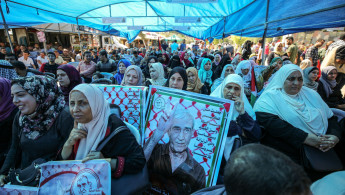Amnesty International condemns "legally-sanctioned torture" of Palestinian detainee
The 'legally-sanctioned torture' of a Palestinian detainee further exposes the complicity of Israel’s authorities, in the systematic violation of the human right to be free from torture, said Amnesty International.
3 min read
Palestinians campaign for rights and release of prisoners (Getty)
The 'legally-sanctioned torture' of a Palestinian detainee during interrogation by officers from Shin Bet, Israel’s Security Agency, further exposes the complicity of Israel’s authorities, including its judiciary, in the systematic violation of the human right to be free from torture, said Amnesty International today.
Samir Arbeed, a member of the Popular Front for the Liberation of Palestine (PFLP), was first arrested by Shin Bet on 26 August, along with three others, in connection with the murder of Rina Shnerb near the West Bank settlement of Dolev on 23 August.
The Ofer military court issued a three-month administrative detention order against him, but during a later hearing the court ordered his release.
On 25 September a special unit of Israeli forces rearrested Samir Arbeed, beating him during the arrest. He was taken to the Shin Bet’s interrogation center at the Russian Compound in Jerusalem and denied access to his lawyer, before being transferred to a hospital in West Jerusalem.
According to Israeli media reports and Samir’s lawyer, a "judicial body" granted Shin Bet special permission to "use exceptional ways to investigate" in his case, effectively sanctioning the use of methods amounting to torture during his interrogation."It is utterly outrageous that the use of torture during interrogations continues to be sanctioned by the Israeli authorities, from the Shin Bet, through the executive branch and all the way to the Supreme Court," said Saleh Higazi, Amnesty International’s Deputy Middle East and North Africa Director.
"Under international treaties, which legally bind Israel, the use of torture cannot be justified under any circumstances. This case exposes Israel’s claims that its judiciary upholds human rights as a complete sham."
Upon his arrest, Samir Arbeed was badly beaten by the Israeli forces and then tortured during interrogation.
According to his lawyer, Mahmoud Hassan of the Addameer rights group, Samir Arbeed appeared in the Ofer military court on 26 September with visible bruises and told the judge he was in pain and unable to eat. Despite this, the torture continued.
On 28 September Samir Arbeed was transferred to hospital after losing consciousness. He was admitted with broken ribs and kidney failure and is currently in critical condition on a respirator.
In 1999, Israel’s Supreme Court ruled that while torture and other ill-treatment were generally prohibited, Shin Bet interrogators who used what the Court described as "physical interrogation methods" in "ticking time-bomb" situations may be exempted from criminal prosecution or even investigation.
Since then, Shin Bet interrogators have tortured hundreds of Palestinians, citing the "ticking bomb" plea, and not one of them has been prosecuted.
"Targeting civilians and killing them is a war crime. There is no doubt that those who perpetrate such killings and other abuses should be held accountable for their actions. But resorting to torture during interrogation is also a reprehensible crime," said Saleh Higazi.
"Israel’s authorities must end their systematic use of torture and ensure that those responsible for the torture of Samir Arbeed, including those with command and other superior responsibility, are held to account."
The Israeli Justice Ministry has launched an investigation into Samir Arbeed’s torture and will examine how his interrogation was conducted and what level of violence was used.
"Claims of ‘ticking time-bombs’ are totally irrelevant to investigations into torture, which is prohibited absolutely. Such claims must therefore play no part in decisions to prosecute," said Saleh Higazi.





 Follow the Middle East's top stories in English at The New Arab on Google News
Follow the Middle East's top stories in English at The New Arab on Google News


